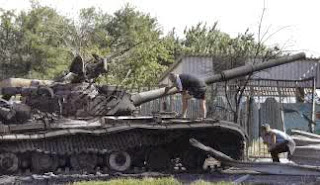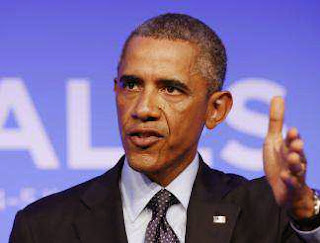
NEWPORT Wales (Reuters) - NATO leaders emerged from a summit in Wales with a plan to protect eastern members from a resurgent Russia, a pledge to reverse the decline in their defense spending, and an embryonic Western coalition to combat Islamic militants in Iraq.
Yet despite ringing declarations of resolve, the U.S.-led alliance cannot fix the conflict between Ukraine and Russian-backed separatists, and the West is still a long way from having a strategy to defeat Islamic State insurgents in Iraq and Syria.
The Cold War era military organization may have reasserted its relevance just as its costly decade-long operation to stabilize Afghanistan draws to an inconclusive end.
But questions remain about the allies' plan to create a rapidly deployable "spearhead" force and their carefully hedged aim of raising defense budgets to 2 percent of national output over a decade. Both are subject to political caveats.
"In some ways, we are solving a non-existent problem because we can't solve the existing ones," a Western defense official, speaking on condition of anonymity, said as the 28-nation summit ended on Friday.
NATO adopted a "Readiness Action Plan" to shield former Soviet bloc central and eastern European states that joined the alliance in the last 15 years by modernizing military infrastructure, pre-positioning equipment and supplies, rotating air patrols and holding regular joint exercises on their soil.
A "spearhead" force of up to 5,000 troops should eventually be deployable "anywhere in the world" within a couple of days, instead of up to several weeks now, to deter an aggressor in a crisis.
While that fell short of the permanent presence of NATO troops that Poland, Estonia, Latvia and Lithuania wanted, they declared themselves satisfied, especially after U.S. President Barack Obama visited Tallinn on the eve of the summit to underline Washington's commitment to defend the Baltic states.
NATO officials say the "spearhead", to be assembled from existing national high-readiness forces based at home, may also be used for expeditionary missions outside the NATO treaty area.
But any such operation would be subject to a unanimous political decision of the 28-nation NATO council and to national caveats limiting what troops can do abroad. For example, Germany would have to obtain prior parliamentary approval.
GREY ZONE
Most analysts believe the main security problems on NATO's eastern flank lie less in a direct Russian military threat to their territory than in permanent instability in the grey zone of former Soviet states between NATO and Russia.
Russian President Vladimir Putin has intervened militarily in Georgia in 2008 and Ukraine this year, and could activate so-called "frozen conflicts" in Moldova or between Armenia and Azerbaijan to prevent those states moving closer to the West.
Having ruled out military action, the West's main levers to curb Kremlin support for pro-Russian separatists in Ukraine and elsewhere are economic sanctions and political ostracism.
Despite their dependence on Russian gas and the economic blowback on lucrative trade with Moscow, European Union nations are on the brink of adopting a fourth wave of sanctions.
The measures are taking a toll on the Russian economy but have not persuaded Putin to abandon his doctrine of "protecting" Russian speakers beyond Moscow's borders, enunciated to justify the annexation of Crimea from Ukraine in March.
Ukrainian President Petro Poroshenko heard plenty of verbal support at the summit and was wise enough not to raise his goal of eventual NATO membership, a red line for Putin on which the alliance is deeply divided.
Poroshenko hinted some allies had offered arms as well as non-lethal support in training and intelligence, but such help may come too late to prevent a de facto partition of Ukraine.
Michael O'Hanlon, a national security expert at the Brookings Institution think-tank in Washington, said Putin's decision to back a ceasefire, apparently timed for the NATO summit, amounted to a recognition that the threat of new sanctions had teeth and Moscow wanted to avoid further pain.
But the summit had also made clear there was little, if anything, that NATO could do to roll back the territorial gains already made by Russia and its separatist allies, he said.
"The kind of ceasefire that we're now seeing in eastern Ukraine is more or less consistent with Western security interests, even though Ukraine won't be getting back Crimea or all of the eastern region," said O'Hanlon.
"But realistically that was already lost."
A senior NATO diplomat said time was on the West's side provided it avoided military confrontation with Moscow, because Russia was in long-term demographic, economic and political decline.
"In the short-term game, in months and maybe even a couple of years, Putin holds a lot of cards, but those are tactical short-term cards, and the longer game, the more strategic game, is almost completely in our favor, if we don't screw it up in the short term, if we don't go to war," he said.
"CORE COALITION"?
The United States sees turmoil in the Middle East as a greater long-term threat to Western security than the crisis in Ukraine.
So it used the NATO summit to bring together what Secretary of State John Kerry called a "core coalition" of 10 nations to combat Islamic State militants in Iraq.
Some though not all of France, Britain, Germany, Italy, Denmark, Poland, Canada, Turkey and Australia may join U.S. air strikes against IS fighters in Iraq. Others, such as the Germans, may help by supplying arms to Kurdish forces fighting IS and providing or transporting humanitarian aid.
Kerry made clear that one common red line for all was "no boots on the ground", ruling out the return of Western ground troops to a country that plunged into civil strife after the 2003 U.S.-led invasion to overthrow Saddam Hussein.
Obama, criticized at home and abroad for his reluctance to use force, reached for the rhetoric of a war leader to declare that the United States and its allies would destroy IS and hunt down and take out its leaders as it had done with al Qaeda.
Some European allies made clear they were worried Washington may be putting the military cart before the political horse.
British, French and German officials all voiced unease about announcing a coalition of Western nations before a new, more inclusive Iraqi government is established and Iraq's Sunni Arab neighbors are engaged in a comprehensive strategy to combat IS.
Some in those Arab states - Saudi Arabia, Kuwait, Qatar and the United Arab Emirates - facilitated the rise of IS to weaken a Shi'ite-dominated Baghdad government and counter Shi'ite Iranian influence in Iraq and Syria.
NATO itself will not take part in any military action, though it may revive a training mission for the Iraqi military and help coordinate the delivery of assistance to Iraq. Its main role is to act as a toolbox from which the United States can put together inter operable forces to work together.
O'Hanlon of Brookings said the summit had not entirely dispelled questions about the alliance's future purpose and transatlantic security cooperation.
Notwithstanding the Ukraine crisis, "NATO's fundamental purpose going forward will be to deal with out-of-area global problems," he said, citing the crisis in Syria and Iraq as well as continued efforts to stabilize Afghanistan.
The summit "didn't provide any floor under defense budgets or general burden-sharing of NATO European security", he said.
(Additional reporting by Steve Holland in Newport and Matt Spetalnick in Washington; Writing by Paul Taylor; Editing by Will Waterman)
FIND OUT MORE ABOUT 'BEN Latest News'
'Like us on Facebook'
http://www.facebook.com/pages/BEN-Latest-News/443681719077160
'Follow us on Twitter'
www.twitter.com/benlatestnews
For Advertisment and Partnering with us contact CEO on BB PIN: 260158B5
BEN Latest News™



























